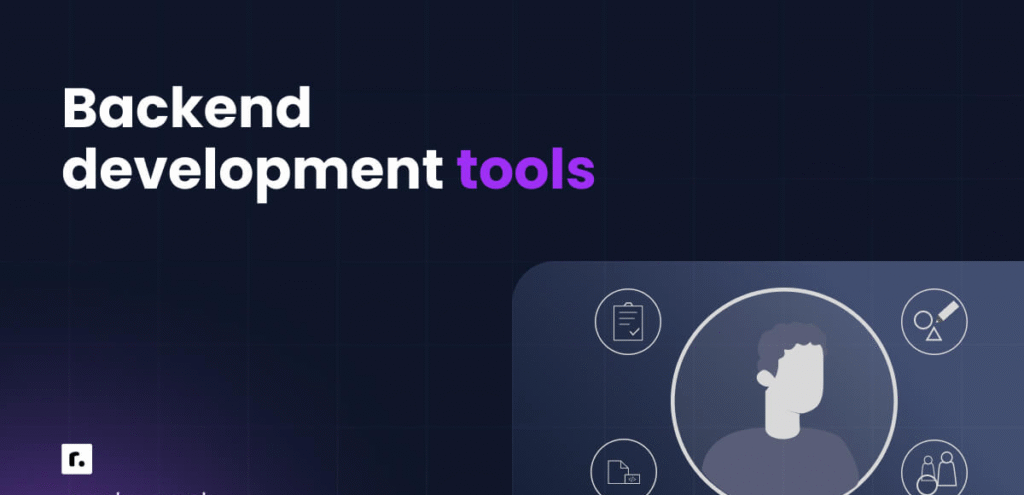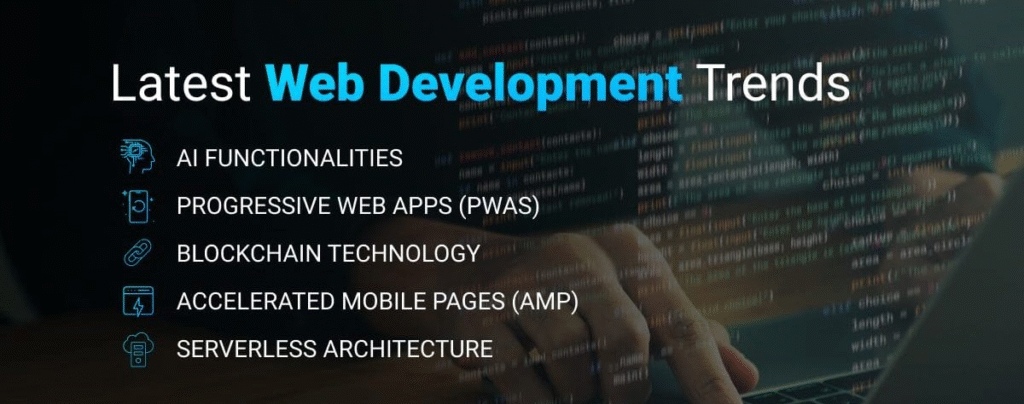The web development landscape has evolved significantly by 2025. Every year new frameworks, tools, and technologies enter the market that help developers deliver more efficient and innovative solutions. If you are a web developer, it is very important to know about the latest trends and tools of 2025. In this blog, we will discuss the top web development tools and technologies that you should use in your projects. These tools will help you increase your productivity and make your development process much smoother.

1. Front-End Development Tools
React.js
Overview :
React.js is a JavaScript library developed by Facebook. It’s useful for building dynamic and interactive user interfaces. React’s component-based architecture improves reusability and maintainability, making it ideal for large projects.
Pros:
- Fast rendering due to Virtual DOM.
- Reusable components make it easier to manage large projects.
- Huge community support aur regular updates.

Cons:
- Learning curve (especially for beginners who aren’t familiar with JSX).
- Frequent updates which can cause compatibility issues.
Angular
Overview :
Angular is a TypeScript-based framework developed by Google. It’s a complete package for web applications, including routing, form management, and state management. Angular is perfect for large-scale applications.
Pros:
- Two-way data binding allows synchronization between model and view.
- Complete ecosystem with ready-to-use solutions for most tasks.
- Large community with plenty of resources and tutorials.
Cons:
- Steep learning curve due to its complexity.
- Performance issues with large applications.
Vue.js
Overview :
Vue.js is a progressive framework that is simple, flexible, and lightweight. It is beginner-friendly and easy to integrate into existing projects. Vue has grabbed a lot of attention compared to React and Angular.
Pros:
- Easy integration into existing projects.
- Small size and fast performance.
- Flexible and allows for custom solutions.
Cons:
- Smaller community compared to React and Angular.
- Lack of enterprise-level support.
2. Back-End Development Tools

Node.js
Overview :
Node.js is a JavaScript runtime environment used for server-side development. It uses a non-blocking I/O architecture, which is ideal for highly scalable applications.
Pros:
- Fast performance due to event-driven, non-blocking I/O.
- Single language (JavaScript) used both on client and server-side.
- Large npm ecosystem for easily adding functionalities.
Cons:
- Callback hell can make code harder to maintain.
- Not ideal for CPU-intensive tasks.
Django
Overview :
Django is a Python-based framework that promotes rapid development. These frameworks offer powerful tools such as security features, ORM (Object Relational Mapping), and an admin panel.
Pros:
- Built-in security features like CSRF protection and SQL injection prevention.
- Scalable and ideal for large applications.
- Batteries-included approach with built-in features.
Cons:
- Monolithic architecture , which is not very flexible for small apps.
- Initial learning curve.
Ruby on Rails
Overview:
Ruby on Rails ek full-stack web development framework hai jo Ruby programming language par based hai. Yeh convention over configuration principle ko follow karta hai, jo development ko speed up karta hai.
Pros:
- Faster development with convention over configuration.
- Strong community support and libraries.
- Ideal for startups aur small-to-medium scale apps.
Cons:
- Performance issues in large applications.
- Learning curve for beginners.
3. Full-Stack Development Tools

MERN Stack
Overview :
The MERN stack is a full-stack JavaScript framework that combines MongoDB, Express.js, React.js, and Node.js. This stack is ideal for developers who want to develop in a single language.
Pros:
- Single language (JavaScript) used on both client and server-side.
- Perfect for single-page applications (SPA).
- Highly scalable and easy to maintain.
Cons:
- Learning curve for beginners.
- Limited libraries compared to other stacks like LAMP.
JAMstack
Overview :
The JAMstack architecture allows static sites to be served alongside dynamic features. This architecture has become a popular trend in modern web development, providing faster loading times and improved security .
Pros:
- Faster load times for static sites.
- Improved security due to decoupled architecture.
- Easy scalability through serverless functions.
Cons:
- Limited real-time data integration.
- Requires deeper understanding of modern web architecture.
4. Version Control & Collaboration Tools

Git
Overview :
Git is a distributed version control system that helps developers efficiently manage and collaborate on their codebases.
Pros:
- Helps in easy collaboration via platforms like GitHub or GitLab.
- Allows easy rollback to previous versions of code.
- Branching features make it easy to work on multiple features simultaneously.
Cons:
- Complex commands for beginners.
- Merge conflicts when multiple people work on the same codebase.
Docker
Overview :
Docker is a containerization tool that allows developers to run their applications in an isolated environment. This tool has become very popular because it improves portability and scalability.
Pros:
- Faster deployment and scalability.
- Easy to manage dependencies and configurations.
- Portability across different environments (development, staging, production).
Cons:
- Requires knowledge of container orchestration tools like Kubernetes.
Conclusion
The world of web development will become even more advanced in 2025, and new tools and technologies will help you build your projects efficiently and creatively. Understanding and using tools like React.js, Angular, Node.js, Django, MERN stack can take your web development skills to the next level. By implementing these tools in your projects, you can achieve better performance, scalability, and maintainability.

Choosing the best tools for your next project is essential, and you need to keep in mind that each tool has its own strengths and weaknesses. By understanding these tools, you can optimize your development workflow and deliver innovative solutions.
#WebDevelopment2025 #TechTrends #WebDevTools #CodingIn2025 #TechInnovation #ReactJS2025 #JavaScriptRevolution# Carrerbook #Anslation #FrontendDevelopment #BackendTech #WebDevCommunity #NextGenTech
